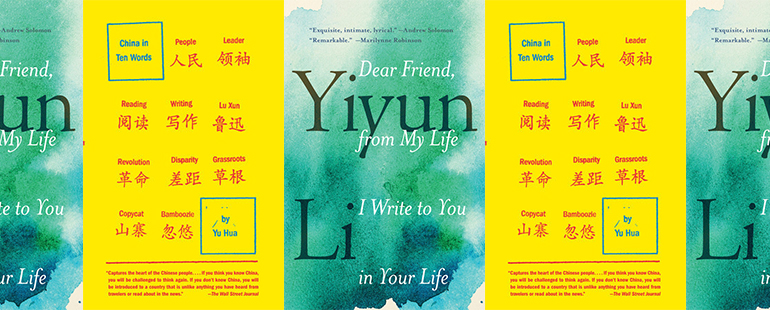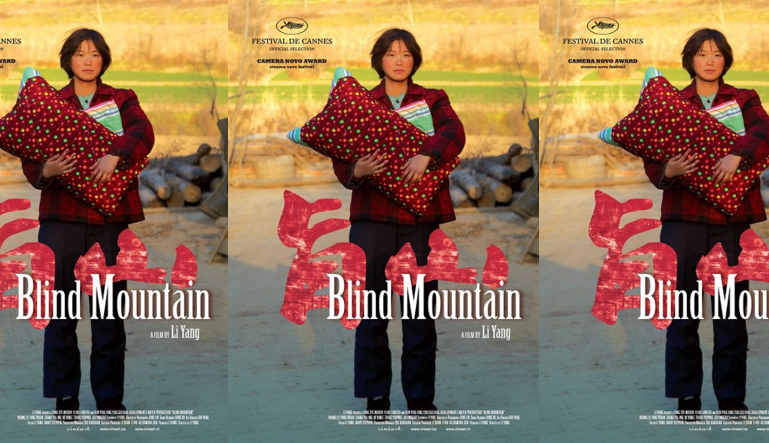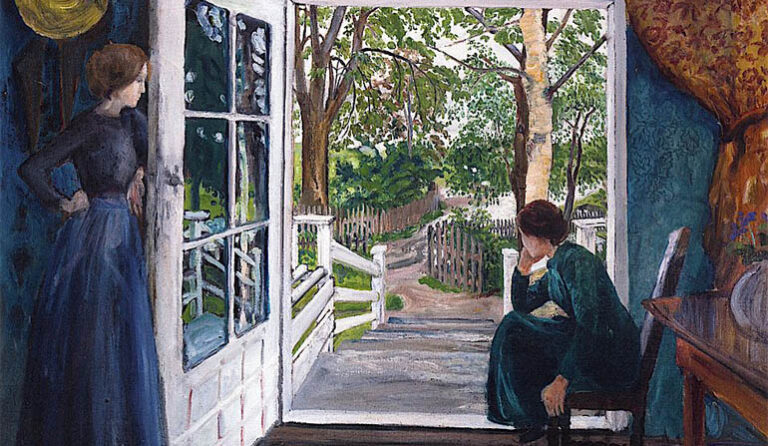Reading, the Collective, and the Formation of the Self

After graduating from high school, shortly after the end of the Cultural Revolution, Yu Hua began his career not as a writer but as a dentist, a job he was assigned to by the government that largely involved pulling teeth and the occasional stint vaccinating kindergarteners and factory workers. As Yu stuck arm after arm with needles barbed by repeated use and metal fatigue, he watched a grimace flicker across workers’ faces and heard the children break into wails—both as a result of their own pain and from seeing the other children’s. Watching these reactions to pain impressed upon Yu the essential quality of writing: that it conveys collective experience. “It is when the suffering of others becomes part of my own experiences that I truly know what it is to live and what it is to write,” Yu writes in the introduction to his 2010 essay collection, China in Ten Words. Yu uses ten words, including “reading” and “writing,” as a lens through which to view his country; it’s pain that runs deepest, pain that most binds his examination.
“Nothing in the world, perhaps, is so likely to forge a connection between people as pain, because the connection that comes from that source comes from deep in the heart,” Yu states. “So when in this book I write of China’s pain, I am registering my pain too, because China’s pain is mine.” Yu writes about the pain and gore he saw on the street during the Cultural Revolution and the pain (though for good) that he inflicts on others, and he articulates how this pain transcends himself and his experience. This, he writes, is what gives literature “a mysterious power . . . that one can read a book by a writer of a different time, a different country, a different race, a different language, and a different culture and there encounter a sensation that is one’s very own.” In other words, one writer’s expression of pain in literature becomes an opportunity for another person to experience that pain vicariously and to discover something of their own. Like the small children witnessing their friends’ pain and reacting to the sensation, readers can develop a unique feeling from what they glean from the page. Books, then, became an inextricable part of Yu’s self, especially because he came of age in a time when they were so scarce and then hungrily devoured them after this time ended. “I hug them close and mimic their steps, slowly tracing the long river of time in a journey where warmth and emotion fuse,” he explains. “They carry me off with them, then let me make my own way back, and it’s only on my return that I realize they will always be part of me.” Escaping through reading becomes identity-forming for Yu, and imagining engagement between himself and the book is essential to the way he reads.
Rather than forming an intrinsic link between self and text as Yu does, Yiyun Li distinguishes between reading to see oneself on the page and reading to observe by approaching engagement with the text from the perspective of someone who has battled mental illness for most of her life. In her 2017 essay collection, Dear Friend, from My Life I Write to You in Your Life, Li reflects on her childhood and young adult years in China as well as her recent hospitalization after two suicide attempts. For Li, minimizing the self is more desirable in reading and writing than displaying the self or connecting the self to the text as Yu does. Li and Yu both view “[l]iving [as] not original business,” but because she views the “I”—the prominence of self—as embarrassing, loathsome, and melodramatic, Li finds connecting to books as Yu does unattractive. Still, she understands this desire to establish a narrative for the self given how eager individuals are to assert their individuality. “To bear the lack of originality,” she acknowledges, “even the least ambitious among us have to invent some way to believe we are distinctive and irreplaceable.” Whether finding identity by fusing self and story or imagining oneself as a novel-worthy heroine, Li does not use reading to express her identity as others do. “To read oneself into another person’s tale is the opposite of how and why I read,” she writes. “To read is to be with people who, unlike those around one, do not notice one’s existence.” Li reads so as to not be seen, not to be swept away in another’s story as if she is a part of it; she finds purpose, instead, in setting aside herself for a while.
Having been conscripted into the Chinese army her first year of college following the Tiananmen Square massacre, Li observes the effects of a blurry photocopy of Gone with the Wind making its way around her platoon. “More than half the girls in my platoon—their personalities ranging from shy to chatty to outright mean—claimed they saw themselves in Scarlett O’Hara,” Li says. “Some of the girls were too interesting, others too boring, to be Scarlett. This collective longing must be part of self-making. There is little originality in this process.” For Li’s peers, Scarlett O’Hara is an attractive, winning heroine, and they see her qualities in themselves, embodying Yu’s assertion that one can see their life mirrored in literature despite obvious differences. “And that, I tell myself, is literature,” Yu concludes—literature can provoke this unique collectivization in individuals regardless of time or place or plot. Yet by casting themselves as Scarlett, the girls belie their desire to be exceptional, worthy of being immortalized in a novel. Ironically, this longing is collective, and in clamoring for an archetype and overlooking their truer, more individual natures, they don’t differentiate themselves so much as entrench their unoriginality. This is a harsh observation on Li’s part, but upon reflection, one remembers the scores of children who’ve grown up imagining themselves as wizards and pioneers. Though Li does not read to see herself in characters, she admits that, “all the same,” fancying you have a bit of Scarlett in yourself is “a brave thing it is to do.” Brave, perhaps, because of the hubris it takes to imagine yourself into a story more widely known and captivating than your own life, but courageous, too, for imagining such a narrative for yourself.
As much as Li wants to evade the self in reading and writing, however, she finds it impossible to do so. “I had a blind confidence that in writing I could will myself into a nonentity,” Li remarks on giving up her career in science to be a writer. “But for those who wish to erase their selves by writing: Why write at all?” she continues, acknowledging that “to write betrays one’s instinct to curl up and hide.” To Li, writing is an essential act and one that is essentially frustrating since it asks the writer to be engaging with the self, which makes her uncomfortable. “Uncharitably one writes in order to stop oneself from feeling too much,” she notes, “uncharitably one writes to become closer to that feeling self.” Li’s use of “uncharitably” is curious: writing that is not overly bathed in feelings makes for stronger writing; writing to understand one’s self better, while perhaps not ideal for good fiction or memoir, is not a bad quality either. Importantly, what Li gets at is the fraught role of emotion and feeling in reading and writing. As an example, she remarks on her desire to refrain from capturing moments like pleasant memories she has with her sister. “These moments shared with others—to write about them is to revive feelings,” she observes, “but it is to leave those feelings behind that I write.” Just as Li seeks estrangement from the self through reading, she seeks estrangement from the self through writing, a flattening of feelings reminiscent of what Mary Karr cautions against in The Art of Memoir. As opposed to Yu’s view of reading and writing allowing for unification between the book and the reader, Li’s experiences are more solitary, though not as oppressively individual as one might assume. “It’s not others who vanish,” Li asserts, “but from others one vanishes.” The I she so resisted remains at the center even if the pronoun is not used. The I looks out at the world, takes in experience, and propels something back.
In the end, Li transcends the individual through the way she focuses so singularly on the I, moments of aloneness, and solitary memories, rather than on feelings she has from shared memories. Yu, too, transcends the individual, though he does so by offering his experience as a way of representing collective experience. As distinctive as the two writers’ views may be, they both operate on the titular phrase for Li’s book: “Dear friend, from my life I write to you in your life,” a line from Katherine Mansfield’s notebooks. After reading this entry and crying and crying, Li wonders, “The books one writes—past and present and future—are they not trying to say the same thing: Dear friend, from my life I write to you in your life?” Li’s and Yu’s books connect their selves across different moments in time, which becomes a sort of freedom as their books release one self and give way to the one to come. “What a long way it is from one life to another,” Li muses, “yet why write if not for that distance, if things can be let go, every before replaced by an after.”


